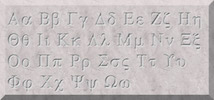 Steven E. Runge and Christopher J. Fresch have edited the papers from the Greek Verb Conference in Cambridge last year into a new volume entitled The Greek Verb Revisited. The book is available as an e-book from LOGOS or as a paperback from Amazon.com. You can preorder from Amazon, and the book will ship when supplies come arrive.
Steven E. Runge and Christopher J. Fresch have edited the papers from the Greek Verb Conference in Cambridge last year into a new volume entitled The Greek Verb Revisited. The book is available as an e-book from LOGOS or as a paperback from Amazon.com. You can preorder from Amazon, and the book will ship when supplies come arrive.
Scholars representing the fields of Linguistics, Classics, and New Testament Studies have contributed chapters, creating a valuable collection from a wide range of perspectives.
The contributors include:
 Rutger J. Allan (Vrije Universiteit, Amsterdam)
Rutger J. Allan (Vrije Universiteit, Amsterdam)- Michael Aubrey (Faithlife Corporation)
- Rachel Aubrey (Canada Institute of Linguistics, Trinity Western University)
- Randall Buth (Biblical Language Center)
- Robert Crellin (Faculty of Classics, Cambridge)
- Nicholas J. Ellis (BibleMesh)
- Buist Fanning (Dallas Theological Seminary)
- Christopher J. Fresch (Bible College of South Australia)
- Peter J. Gentry (Southern Baptist Theological Seminary)
- Geoffrey Horrocks (Faculty of Classics, Cambridge)
- Patrick James (The Greek Lexicon Project; Faculty of Classics, Cambridge)
- Stephen H. Levinsohn (SIL International)
- Amalia Moser (National and Kapodistrian University of Athens)
- Christopher J. Thomson (University of Edinburgh)
- Elizabeth Robar (Tyndale House, Cambridge)
- Steven E. Runge (Lexham Research Institute; Stellenbosch University)
Mike Aubrey, one of the contributors, announced this publication on his blog back in September. I decided to post a notice here to add my recommendation that you purchase it!


 Louis Sorenson has produced a nice reading of the first nine chapters of Mark’s Gospel following Westcott and Hort’s 1881 text using the Restored Koine pronunciation. His
Louis Sorenson has produced a nice reading of the first nine chapters of Mark’s Gospel following Westcott and Hort’s 1881 text using the Restored Koine pronunciation. His 


 I’m looking forward to tomorrow (November 19, 2016)! Jonathan Robie and I will present our ongoing work on the communicative Koine Greek course, γραφὴ ζῶσα. Our presentation will take place at the 1:00 pm session of the Global Education and Research Technology section of the Society of Biblical Literature (SBL).
I’m looking forward to tomorrow (November 19, 2016)! Jonathan Robie and I will present our ongoing work on the communicative Koine Greek course, γραφὴ ζῶσα. Our presentation will take place at the 1:00 pm session of the Global Education and Research Technology section of the Society of Biblical Literature (SBL). If you are interested in Open Source software or Open Data projects for the Biblical languages, I would like to recommend the following sessions at SBL:
If you are interested in Open Source software or Open Data projects for the Biblical languages, I would like to recommend the following sessions at SBL: Steven E. Runge and Christopher J. Fresch have edited the papers from the Greek Verb Conference in Cambridge last year into a new volume entitled
Steven E. Runge and Christopher J. Fresch have edited the papers from the Greek Verb Conference in Cambridge last year into a new volume entitled